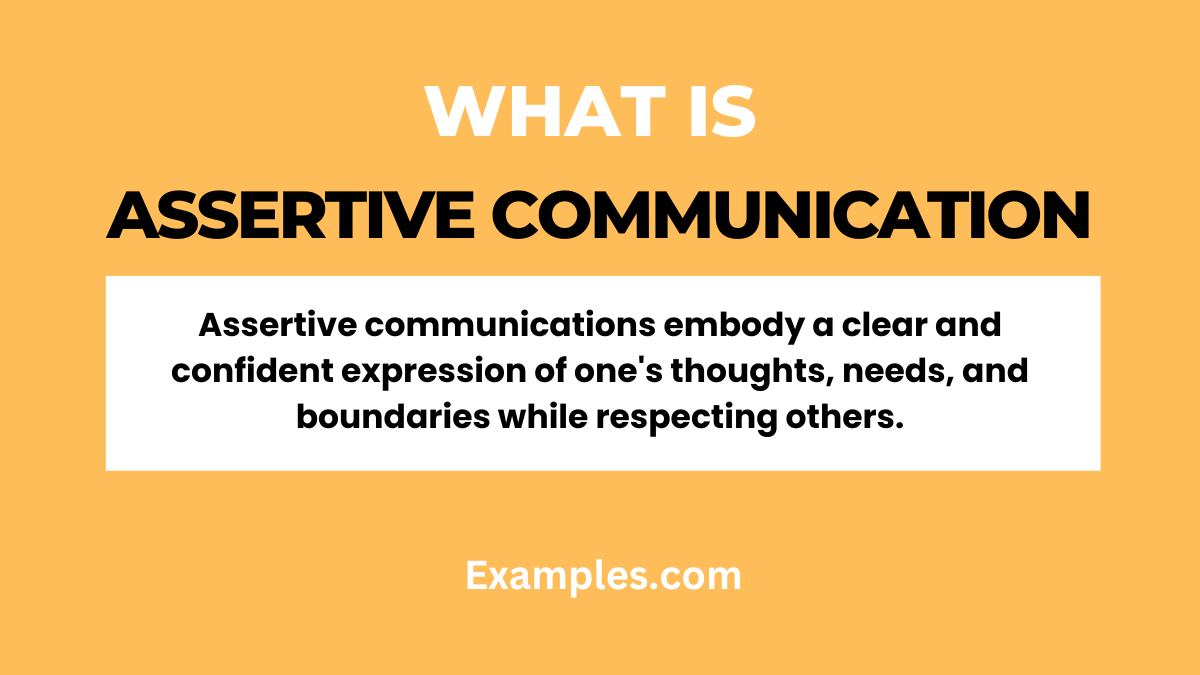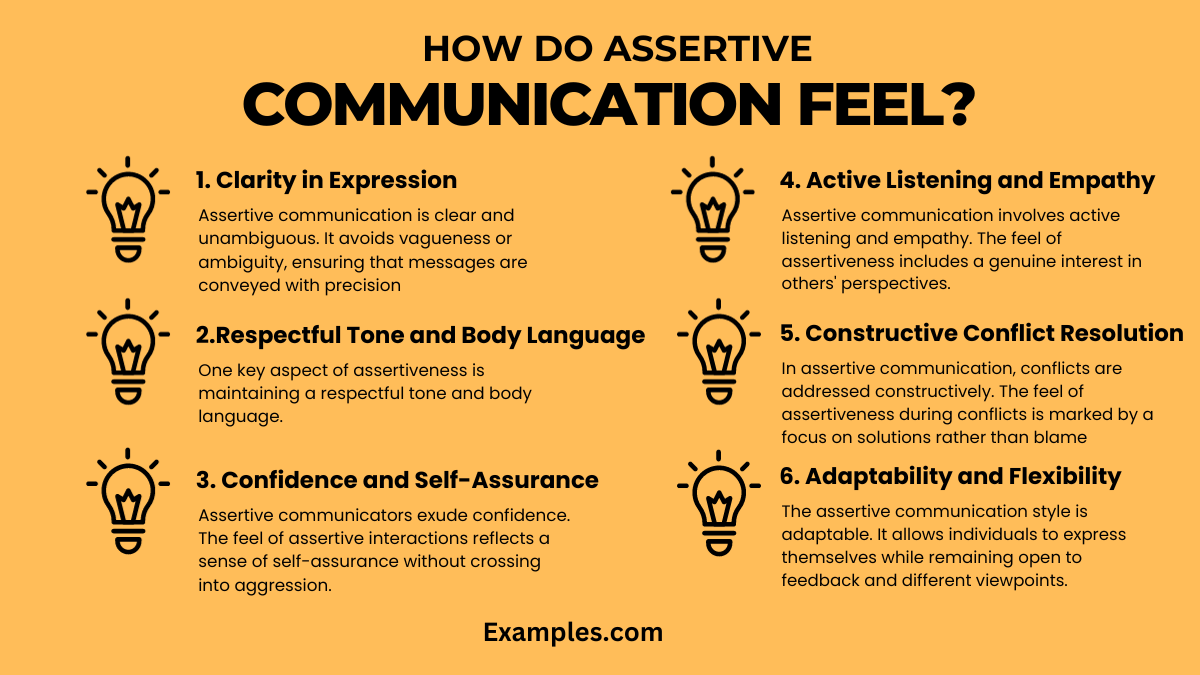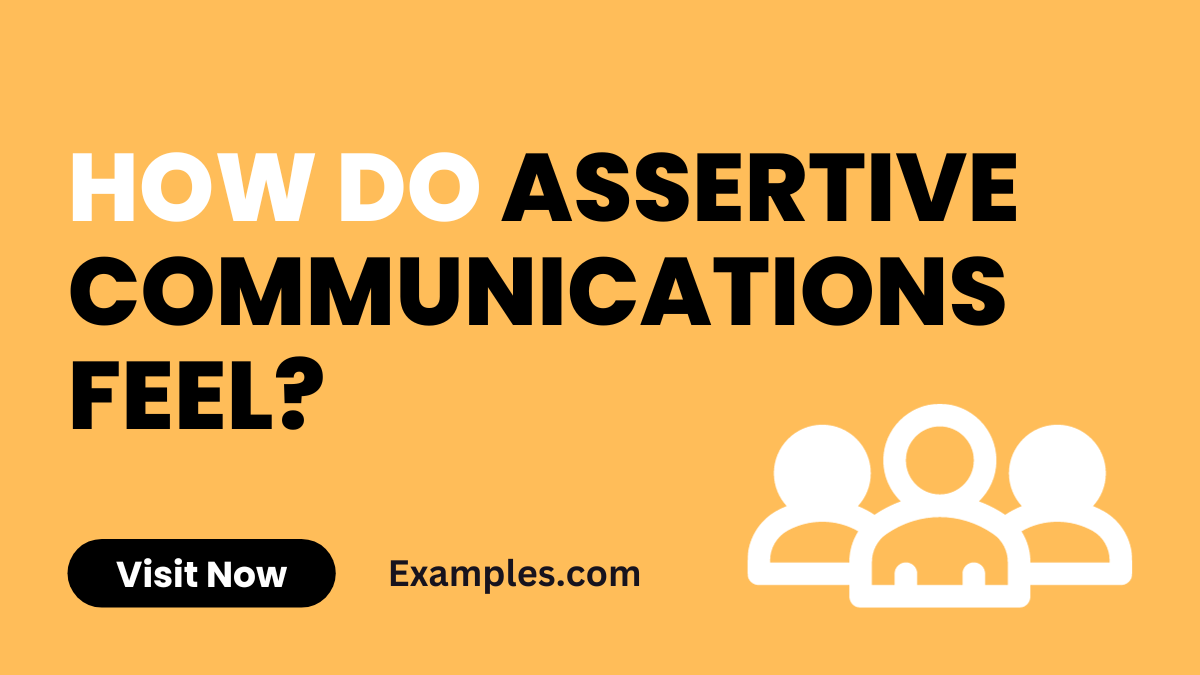How do Assertive Communications Feel?
Unlock the transformative power of assertive communication in our comprehensive guide! Wondering how assertive communications feel? Dive into a journey of self-expression and confidence with vivid Communication Examples. Learn the nuanced art of effective communication, explore the impact of assertiveness, and equip yourself with practical examples that illustrate the feel and benefits of assertive interactions. Elevate your communication skills and navigate social dynamics with newfound confidence. Let’s embark on this enlightening exploration together!
What is Assertive Communication?

Assertive communications embody a clear and confident expression of one’s thoughts, needs, and boundaries while respecting others. This communication style fosters open dialogue, ensuring that individuals feel heard and understood. Unlike aggression or passivity, assertiveness strikes a balance, promoting healthy interactions. In simpler terms, assertive communications feel empowering, respectful, and contribute to positive relationships. Let’s delve deeper into the characteristics and nuances that define the feel of assertive interactions.
What Does Assertive Communication Feel Like?
Assertive communication elicits a distinctive and empowering sensation, reflecting a balance between self-expression and respect for others. When engaging in assertive communication, individuals experience a profound sense of confidence, as their thoughts and needs are conveyed with clarity and conviction. This communication style fosters an atmosphere of mutual understanding, creating a space where opinions are valued. The feel of assertive communication is marked by a positive energy, promoting healthy relationships and constructive interactions. Let’s delve into the nuanced aspects that define this empowering experience.
What are the effects of assertive communication?
Assertive communication wields a profound impact on interpersonal dynamics, shaping relationships and fostering healthy connections. When individuals embrace this communication style, they experience a range of positive effects.
Promoting Mutual Respect: Assertive communication creates an environment where individuals respect each other’s opinions and boundaries. It establishes a foundation for open dialogue, paving the way for meaningful conversations.
Building Self-Confidence: Expressing thoughts and needs assertively boosts self-confidence. As individuals communicate effectively, they develop a sense of empowerment, contributing to personal and professional growth.
Enhancing Relationship Quality: In both personal and professional settings, assertive communication strengthens relationships. It cultivates trust, transparency, and understanding among individuals, leading to more fulfilling connections.
Reducing Conflict: Assertiveness acts as a natural conflict deterrent. By clearly expressing thoughts and feelings, misunderstandings are minimized, reducing the likelihood of conflicts arising.
Fostering Collaborative Environments: Teams thrive in environments where assertive communication is embraced. It encourages collaboration, idea-sharing, and a collective pursuit of common goals.
Empowering Decision-Making: Assertive individuals feel more empowered to make decisions. They can voice their opinions, contributing to informed and well-rounded decision-making processes.
Improving Emotional Well-being: Assertive communication contributes to positive mental health. The ability to express oneself authentically and receive validation enhances emotional well-being and reduces stress.
How do Assertive Communications Feel?
Assertive communication is a dynamic and empowering style that shapes the feel of interpersonal interactions. It’s characterized by clarity, respect, and confidence. When employing assertiveness, individuals express their thoughts and needs openly while considering others’ perspectives. The feel of assertive communication is marked by a balanced and respectful exchange, creating an atmosphere of mutual understanding. It promotes a sense of empowerment, as individuals navigate conversations with self-assurance and contribute positively to relationships. Now, let’s delve into the distinct features that define the assertive communication style.

Clarity in Expression: Assertive communication is clear and unambiguous. It avoids vagueness or ambiguity, ensuring that messages are conveyed with precision. This clarity contributes to a straightforward and understandable exchange, shaping the feel of assertive interactions.
Respectful Tone and Body Language: One key aspect of assertiveness is maintaining a respectful tone and body language. The feel of assertive communication includes a balance between expressing one’s needs and respecting the rights and opinions of others. Nonverbal cues play a crucial role, fostering an environment of mutual respect.
Confidence and Self-Assurance: Assertive communicators exude confidence. The feel of assertive interactions reflects a sense of self-assurance without crossing into aggression. Confidence in expressing thoughts and setting boundaries contributes to a positive and empowering communication style.
Active Listening and Empathy: Assertive communication involves active listening and empathy. The feel of assertiveness includes a genuine interest in others’ perspectives. This empathetic approach strengthens relationships and fosters a cooperative atmosphere.
Constructive Conflict Resolution: In assertive communication, conflicts are addressed constructively. The feel of assertiveness during conflicts is marked by a focus on solutions rather than blame. It encourages open discussion and problem-solving, contributing to a healthy communication style.
Adaptability and Flexibility: The assertive communication style is adaptable. It allows individuals to express themselves while remaining open to feedback and different viewpoints. The feel of assertiveness is characterized by flexibility, promoting a collaborative and inclusive environment.
In conclusion, assertive communication is a dynamic and transformative style that significantly influences how we interact with others. It’s characterized by a clear and respectful expression of thoughts, feelings, and needs, which creates a balanced atmosphere of mutual understanding. This communication style not only boosts self-confidence and emotional well-being but also fosters healthier and more fulfilling relationships. Assertiveness in communication is empowering, enabling individuals to navigate various interactions with self-assurance and contributing positively to personal and professional growth.
For those looking to delve deeper into assertive communication and its benefits, the Herbert Wertheim UF Scripps Institute for Biomedical Innovation & Technology offers insightful ideas for relating to others with less conflict and more confidence here. Additionally, the Student Health and Counselling Services at UC Davis provide valuable resources on assertiveness, including techniques and exercises for developing this essential skill here. These resources can be a great asset in enhancing your assertive communication skills, contributing to a more assertive and confident approach in various aspects of life.



